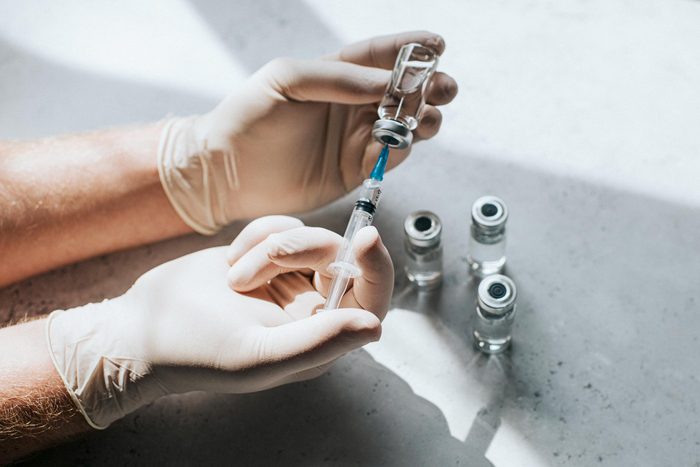Here’s How Long the COVID-19 Vaccine Really Works, Says New Study
Updated: Jul. 05, 2023

Is your COVID-19 vaccine still packing a punch? Here's what the latest study reveals.
In early May, the World Health Organization (WHO) chief, Dr. Tedros Adhanom Ghebreyesus, declared an end to COVID-19 as a global health emergency. The WHO-led Emergency Committee examined data for over a year to determine when to make the announcement. Dr. Ghebreyesus, briefing the media at WHO’s headquarters in Geneva, stated that the virus is here to stay: “It is still killing and it is still changing. The risk remains of new variants emerging that cause new surges in cases and deaths.”
Despite this, for over 12 months, the pandemic “has been on a downward trend,” with immunity increasing due to highly effective vaccines developed in record time, resulting in decreased infection and death rates. “This trend has allowed most countries to return to life as we knew it before COVID-19”, added Dr. Ghebreyesus.
As of June 2023, the WHO’s Coronavirus Dashboard shows an astonishing 13.4 billion vaccine doses administered globally, and the cumulative cases stand at 768,187,096, with 6,945,714 deaths.
5 Long COVID Symptoms That’ll Help Explain the Way You’re Feeling
Waning efficacy of COVID-19 vaccines: What you need to know
In May 2023, the Journal of the American Medical Association (JAMA) published a thorough study that analyzed a wealth of data to assess how well COVID-19 vaccines perform over time. The analysis included 40 different studies.
One of the main findings was regarding the efficacy of vaccines against the symptomatic infections caused by the Omicron variant. The study revealed that the vaccines prevented symptoms in approximately 52.8% of cases one month after the initial vaccination. However, this efficacy diminished to 14.3% effective at six months and 8.9% at nine months.
In comparison, the vaccines were more effective against the Delta variant. The study showed that the efficacy against symptomatic Delta infections was 79.6% one month after vaccination. While this also declined over time, it did so slowly, remaining at 49.7% nine months later.
Additionally, the study highlighted the positive impact of booster doses. They were found to significantly increase vaccine efficacy, bringing it closer to the levels seen shortly after the initial vaccination. However, it’s important to note that this increased efficacy also waned over time.
The study also provided insights into the performance of different vaccines. Moderna and Pfizer-BioNTech had higher initial efficacy compared to AstraZeneca and Sinovac.
5 Fast Facts About the New COVID Variant, Arcturus
Putting it in perspective
In an interview with TIME, Marco Ajelli, PhD, associate professor of epidemiology and biostatistics at the Indiana University School of Public Health and an author of the study, stated, “This study is showing that the protection [from vaccines] is very high at the beginning, but it wanes quickly.” He added, “That’s exactly in line with what we observe for influenza.”
Ajelli went on to draw parallels between the flu vaccine and COVID-19 vaccines. “We know we get an influenza shot every year because the protection from last year’s shot doesn’t work through this year,” he explains. “The situation for COVID-19 will be very similar…we need to get into a cycle or loop to get a new dose to boost protection.”
Piero Poletti, PhD, a senior researcher at the Center for Health Emergencies of the Bruno Kessler Foundation in Italy and another author of the study, voiced concerns over not administering repeated booster doses. He said, “Without repeated booster doses for the population, I think the virus circulation will be left uncontrolled.” This could give the virus ample chances to evolve into even more aggressive strains.
Which Vaccines Do You Need This Year? Here’s the Breakdown for All Ages
Staying one step ahead
As the WHO chief has rightly emphasized, the virus is still a part of our lives and is constantly evolving. It is important to adhere to guidelines from health authorities and stay informed of the latest developments to make informed decisions for yourself and your community.
While the pandemic is on a downward trend, and much of the world is returning to normalcy, it’s easy to fall into complacency. The vaccines have played a monumental role in turning the tide, but with the ever-present threat of new variants, a proactive approach to vaccination and public health measures remains essential. In short, speak with your doctor to get your vaccine if you haven’t already, and get your booster when it’s time.
For the latest in health and wellness, get The Healthy @Reader’s Digest newsletter. Keep reading for more expert advice:













